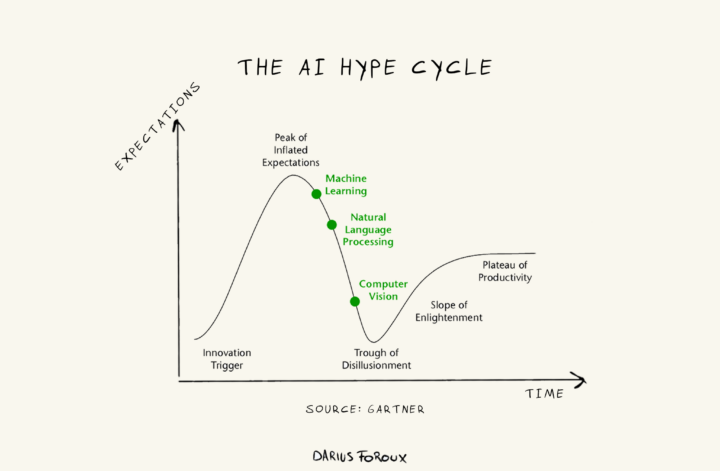When you start your career, you’re more likely to fail. And making money becomes harder.
Ouch. That hurts. But it’s better this lesson hurts you now than let failure discourage you.
According to data about the failure rate of small businesses, somewhere between 5% and 25% of new businesses make it beyond 15 years.1This data is not conclusive. Some sources mention a long-term failure rate of 95% and others mention 75%.
My dad and I started a wholesale company of laundry equipment in 2010, and our company is still around today. None of the companies that started around the same time in our industry are alive now.
Our competitors are the ones who were already in business long before we started. The new players came and went. So the success rate really depends on your industry. In my experience, 95% of new businesses are no longer around 10 years later.
You can say the same thing about writers. I started writing in 2015. I saw many people who started around the same time in my category. Other than a handful of others, I don’t think the others are around.
Investor Brian Gelber, who was profiled in the book, Stock Market Wizards: Interviews with America’s Top Stock Traders, talked about this dynamic of success/failure when it comes to traders:
“Out of every 100 people who go to the floor to become traders, how many will make at least a million dollars within five years? Maybe five or less. How many will end up losing everything they came in with? At least half.”
In his experience, less than 5% of traders succeed big. Most fail. Some will do well.
This is true for nearly every competitive thing in life.
Focus on being smart, not on knowing a lot or working hard
How do you succeed? How do you make money? How do you build a stable career?
No one has clear-cut answers to those questions. However, we do have the answer to not succeeding.
For example, there’s no direct relationship between success and knowledge. Or success and hard work.
This is a misconception about life. Many people say things like:
- Build it and they will come
- If you work hard, you will succeed
- If you learn more, you will earn more money
These things are not untrue. But they only give you part of the equation. In my experience, hard work, grit, showing up, doing the work, learning, building, making, etc., are not the decisive factors.
To succeed, you need to have the odds in your favor. This is what I mean about being smart.
A smart person is not someone who knows a lot. A smart person is someone who gets their way more often than others. A smart person plays to win.
Can you learn how to be smart? I think so.
Principles that will help you to win more often
To be smart, simply spend your time and energy thinking about how you can win. Look at everything you want to achieve in life as a game. And focus on principles that you can apply to every game. Here are a few of those principles.
1. If you can’t win, don’t play.
Many of the students who take my course on starting a business don’t start one immediately. And that’s a good thing. The first part of the course is about finding out whether you can win with your business idea.
For many business ideas, the answer is no. So you save yourself a lot of time and energy. I encourage my students to take their time to find an idea that gives them better odds of winning. Sometimes that takes more time, which is fine. You’ll be better off in the long run.
2. Live according to a very high standard.
I’m a firm believer in the platitude, “The way you do one thing is how you do everything.” The moment I decided to take every single area of my life seriously, I started to see things improving.
I apply this thinking to everything. From my diet, sleep, and exercise, to my work, relationships, and even simple things like keeping my house clean. In everything I do, I want to give my full attention and do a great job. When you do a great job, you’re more likely to win.
3. Take care of your body and mind.
Taking care of your mental and physical health deserves a separate item because it’s so important. If you’re not feeling okay, it’s very difficult to get anything done in your career.
Think of a time you weren’t eating and sleeping well. And you also didn’t exercise. How did you feel? I’ve been there before in my life.
During that time, I woke up tired, had heavy eyes all day long, was agitated, and felt restless during the evenings. It wasn’t a good time and I can’t even remember what I did at work because I was lost in thought half of the time.
Now I’m so serious about my health that I’m willing to drop everything in my career if I don’t feel well. Health must be #1. It’s not just something you say, it’s something you live by.
4. Brush off minor things.
- I wasted so much money on clothes
- My birthday party was canceled
- I didn’t get a raise
- My revenue was lower last month
- I made a mistake at work
So? Most things in life are not that important when you think about it.
The well-being of your self, family, partner, close friends, and team members matters most. So what if you or someone made a mistake? So what if you lost some money? It’s minor compared to the things that are really important.
Stay focused. Keep moving forward.
5. Carry yourself with poise.
Poise is somewhat of a forgotten term in today’s vocabulary. A person with poise is balanced.
If you have poise, you’re confident and calm at the same time. You remain focused under pressure. You’re good at what you do and you carry yourself that way. But you’re not arrogant and you don’t have the need to show off.
You can develop poise by becoming good at what you do and believing in your abilities. When you combine those two aspects, you have a winning combination.
Tip the odds in your favor
I strongly believe you can destroy the odds of failure with the above principles. When you apply these lessons, you play by different odds.
And while we don’t know exactly what your odds of making money will be, they are undoubtedly higher than people who simply go with the flow of things.




